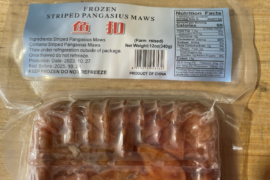Scotland’s University of Stirling postdoctoral researcher Simão Zacarias is the recipient of the eighth annual Global Aquaculture Innovation Award, sponsored by Lineage Logistics, the Global Aquaculture Alliance announced on October 19. He edged out Pablo Berner of Nuseed and Mark Luecke of Prairie AquaTech to win the competition.
Zacarias’ work zeroed in on the common – and, in animal-welfare circles, contentious – shrimp-hatchery practice of unilateral eyestalk ablation. His research debunked the notion that the practice results in higher egg production and showed that it actually escalates disease vulnerability.
Zacarias proved in laboratory testing that postlarvae and juveniles from non-ablated Pacific white shrimp broodstock showed higher survival rates when they were challenged with two key diseases. He also proved that a similar egg production rate can be attained without resorting to eyestalk ablation by giving broodstock, in their pre-maturation stage, high quality, nutritious feed.
In addition to the University of Stirling, Zacarias’ work was supported by Benchmark Holdings, Labeyrie Fine Foods, Seajoy and SyAqua, among others.
“This year’s innovation award is a heartwarming example that breakthroughs can be driven by a single dedicated student enabled by the right collaborative opportunity. Our hats go off to Dr. Zacharias for his life-changing decision to venture far from Mozambique and persevere in his goals, to Dr. David Little of University of Stirling who opened the doors and showed him the way, and to the commercial collaborators at Seajoy in Honduras and Benchmark in Thailand, who welcomed him to use their tools,” said GAA President and Founder George Chamberlain, one of five judges for the competition.
“It is an honor to win this prestigious award, mainly as the first African to get it. This award reminds me to never give up in chasing my dreams even when they seem impossible,” said Zacharias. “I also think that it is a direct message to the shrimp and aquaculture industry as a whole to keep adopting stronger animal welfare practices.”
Only nine votes separated Zacarias from the runner-up. Berner’s ag-tech company uses genetic engineering to turn canola plants into prolific producers of omega-3 oils and other nutritionally important fatty acids. Nuseed’s product is called Aquaterra.
Luecke’s Praire AquaTech produces ME-PRO, a plant-based protein ingredient for aquaculture feeds manufactured in South Dakota that has two primary goals – sustainability and digestibility. ME-PRO is short for “microbially enhanced protein.”
In 2012, GAA established the Global Aquaculture Innovation Award to recognize individuals and companies finding new solutions to the key challenges facing aquaculture. This year, GAA received a total of 30 applications from 17 countries – Belgium, Canada, Chile, Denmark, India, Indonesia, Israel, Malaysia, Mexico, the Netherlands, Norway, Panama, Spain, United Kingdom, United States, Tanzania and Thailand.
The competition is coordinated by GAA Standards Coordinator Dan Lee. In addition to Lee and Chamberlain, the judges are existing and former GAA Standards Oversight Committee members Alejandro Buschmann of i-mar Research and the Development Center of Coastal Resources and Environments; Dawn Purchase of the Marine Conservation Society; and Michael Tlusty of the University of Massachusetts-Boston. For the third consecutive year, the winner was selected by an audience vote.
Applications for the ninth annual Global Aquaculture Innovation Award will be accepted beginning in the spring. GAA’s GOAL 2021 conference is scheduled to be held in Tokyo, Japan, from October 25-28.






